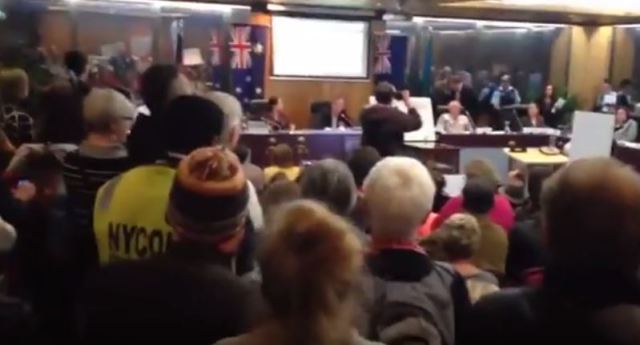Hired security guards will oversee the next Inner West Council meeting after protestors shut down the new council’s first meeting last Tuesday and administrator Richard Pearson was spat on and his papers and iPad knocked to the ground.
Riot police were called to the council chambers in Inner West Sydney, after protests got out of hand. A woman was later charged for offensive behaviour over the spitting incident.
Mr Pearson told the Inner West Courier that limits mights also be enforced on how many people could enter the council chamber at the next meeting, likely to be held in June.
“We’re looking at a range of things we can do to ensure staff, myself, community members and the media are in a safe environment,” Mr Pearson told The Courier. “We will need to have security at future meetings.
“I want to be sure that when we lock in the next one, we have our logistics sorted so we can minimise (disruption) happening again,” he said.
“Priority number one is public safety and we also have to consider building regulations and fire standards to ensure we’re not exceeding capacity.”
He hoped that people would understand the importance of the council meetings to the community and that the agenda could be discussed.
Former Leichhardt Mayor Darcy Byrne encouraged people to turn up to the next council meeting but to let it play out peacefully.
“My view is that council meetings are really the only democratic form that we have left and I think people should attend and express dissent with decisions not in the community interest,” Mr Byrne said. “That can’t occur if meetings don’t proceed.”
Over at the Mid Coast Council (previously Taree, Great Lakes and Gloucester Councils) the first council meeting was overpowered by protestors. The “Knitting Nannas” made their feelings known about coal seam gas mining in the area the meeting.
NSW Local Government Minister Paul Toole said that such disruption had been rare since the State’s 19 new councils – proclaimed in May – had begun meeting.
“Across NSW, meetings of new councils have run smoothly and successfully except where a deliberate disruption by a small minority has occurred,” Mr Toole said.
“New councils will communicate with the community in the same way councils always have, through websites, newsletters and local media.”
He said last week: “I don’t think we will see this kind of behaviour occurring across NSW.”
Mr Toole said that security at council meetings was a matter for the council and police operations were a matter for the NSW Police.
Councillors, mayors and MPs have called for Premier Mike Baird to bring forward the September 2017 local government elections but Mr Toole said this was not going to happen.
“The Electoral Commission advised the Government that it was impossible to hold elections for new councils in September 2016,” Mr Toole said.
“The Commission also indicated that it was their preference that elections for new councils be held in September 2017 to allow them to be ready. Further, the time allows Administrators to successfully integrate the council organisations in time for the election of councillors to new councils.”
Premier Mike Baird must feel like a soap opera hurtling towards its grisly cliff-hanger right now. A large anti-Baird rally took place last weekend, not just over council mergers but also over lock-out laws, new bio diversity and protest laws, tree removal and major developments such as motorway project WestConnex.
On the council merger front, there are several court actions in progress this week, including Walcha and Woollahra Councils, with councils hoping to prove that mergers have not been carried out fairly.
In addition, former Lane Cove councillor Scott Bennison is battling to get more documents relating to the KPMG report released in the NSW Civil and Administrative Tribunal.
Councils are desperate to get their hands on the long form KPMG report because it contains modelling and costings which form the basis of the government’s claim that forced mergers will save $2 billion over 20 years.
Walcha Council lost its Land and Environment Court battle to have KPMG documents released last week. The documents were Implementation of Local Government Mergers: Business Case and Options Analysis Local Government Reform.
Comment below to have your say on this story.
If you have a news story or tip-off, get in touch at editorial@governmentnews.com.au.
Sign up to the Government News newsletter


